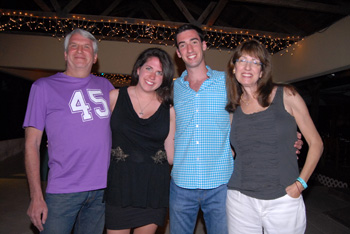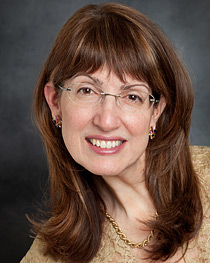Alumna helps make lawyers better teachers in court
The career of social psychologist Julie Blackman '74 has spanned the gamut from battered women to Leona Helmsley, from the inventor of the artificial hip to Martha Stewart.

Julie Blackman '74, right, with (from left) husband Mitchell Dinnerstein, daughter Molly Dinnerstein '11 and son Jed Dinnerstein '07.
For someone who has worked in some of the darkest areas of the human psyche, Blackman has retained the invaluable ability to laugh, even at her own expense. When explaining the major she crafted at Cornell, Contemporary American Personality, she says, "I thought, 'How great it would be if I just put together sociology and psychology?' Turned out I wasn't the first person to have thought of that." She went on to earn a Ph.D. from Columbia University in social psychology, then spent 10 years teaching at Barnard College.
She's now a trial strategy consultant with a national practice, specializing in complex litigation, with a particular emphasis on intellectual property and white-collar crime cases. She began her work in the courts as an expert witness in cases of battered women who killed their abusers. In all of these areas, Blackman has enjoyed working at the interface of psychology and the law.
Early in her career, Blackman spoke to mothers in battered women's shelters, trying to teach a simple concept: Don't hit your kids. "Violence happens across classes, but violence is partly a byproduct of stress and being at the end of one's rope, and that happens more often to people with fewer resources," explains Blackman. "There are, of course, rich people who have domestic violence problems. I worked on a murder trial of a woman who was quite wealthy and whose husband was a Cornell alum. She killed him in the midst of an attack by him against her and was acquitted at trial. I helped her attorney to pick her jury."
In past years, Blackman served as an expert witness in numerous cases of battered women who killed their abusers in self-defense; her 1989 book, "Intimate Violence, a Study of Injustice" (Columbia University Press) deals with the topic.
These days, Blackman's company does telephone surveys, focus groups and mock trials designed to help attorneys make more informed judgments about how to put their best foot forward in the courtroom. "Our niche is complex litigation," says Blackman. "I'm an advocate for the listener, whether it's the judge or the jury. I'm there to help lawyers become better teachers of complicated ideas."

Julie Blackman '74
Leona Helmsley's trial was Blackman's first high-profile case. She recalls going from a meeting with Helmsley at her apartment overlooking Central Park to Riker's Island where she visited an incarcerated woman. "I was really committed to not talking to the two women differently," Blackman says. "I didn't want to be someone different when I was on Central Park South and when I was on Riker's Island."
Patent attorneys often engage Blackman to conduct mock trials to help them understand how to convey complex technologies to jurors, some of whom may not have graduated from high school. "I'm really still an academic at heart," Blackman admits. "My mission is in large part pedagogy. How do you teach this really hard stuff so when the jurors go off to deliberate, they make meaningful decisions, and they're not just reaching a random decision? People go to jail on these decisions or don't. Corporations live or die on these decisions. It's important for people to get it."
Blackman lapses into more casual language to describe her enthusiasm for patent cases. "It's been very cool," she says. "I've gotten to meet inventors whose inventions have changed people's lives -- from computer technologies to pharmaceuticals to medical devices. It's been exciting to learn about all these things and to try to help lawyers teach these technologies to jurors. I've been grateful for Cornell's [course] distribution requirements. Sometimes, I joke that I am the rare psychologist who says the most useful class I took in college was calculus."
"It's been an interesting life," Blackman muses. "I appreciate Cornell's part in helping me get here."
Molly Dinnerstein, daughter of Blackman and her husband Mitchell Dinnerstein, is now a senior at Cornell, majoring in art history; their son, Jed Dinnerstein, has echoed Blackman's interests: a Cornell psychology major, he's now at Fordham Law School. "Cornell was a great place for me, and my kids love it too," Blackman says. She recently became chair of Cornell's Arts and Sciences Career Connections subcommittee pertaining to law, which she describes laughingly as a "committee in search of a shorter name."
Linda Glaser is a staff writer for the College of Arts and Sciences.